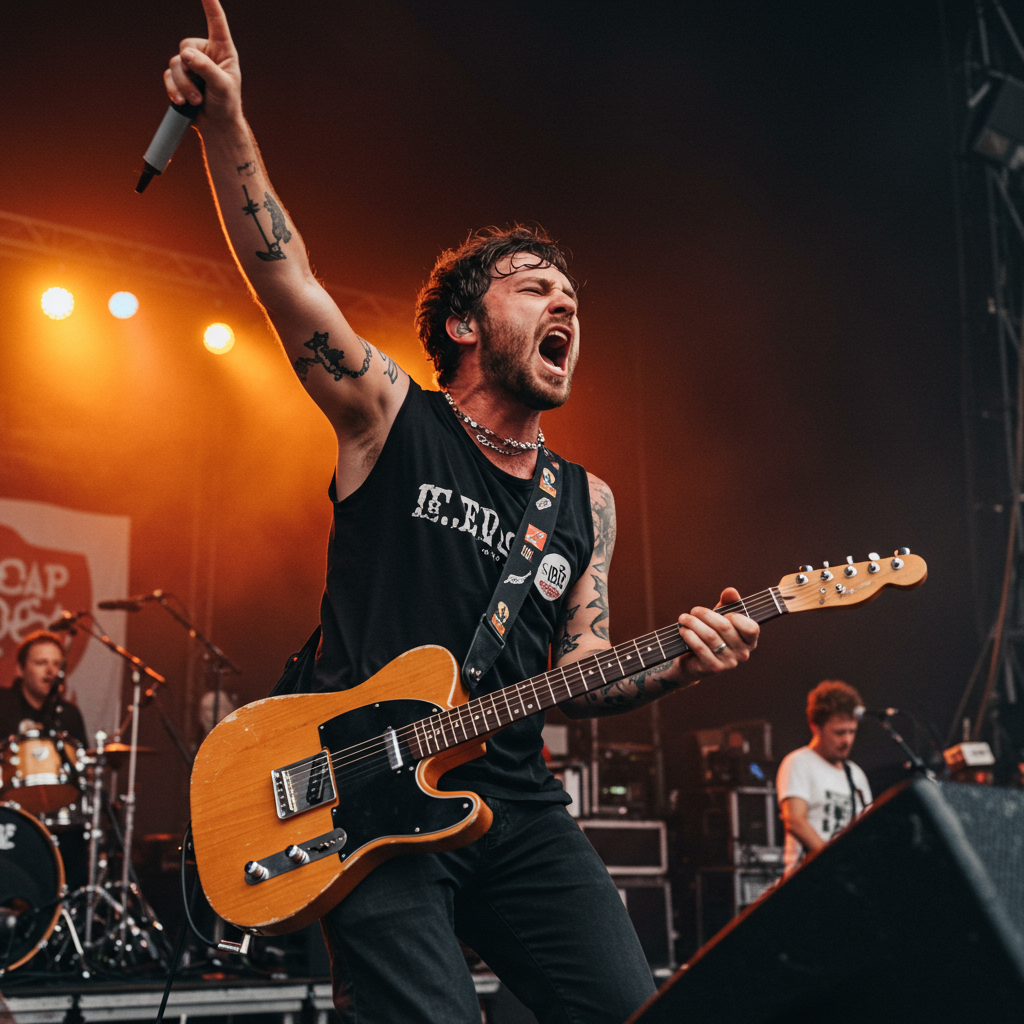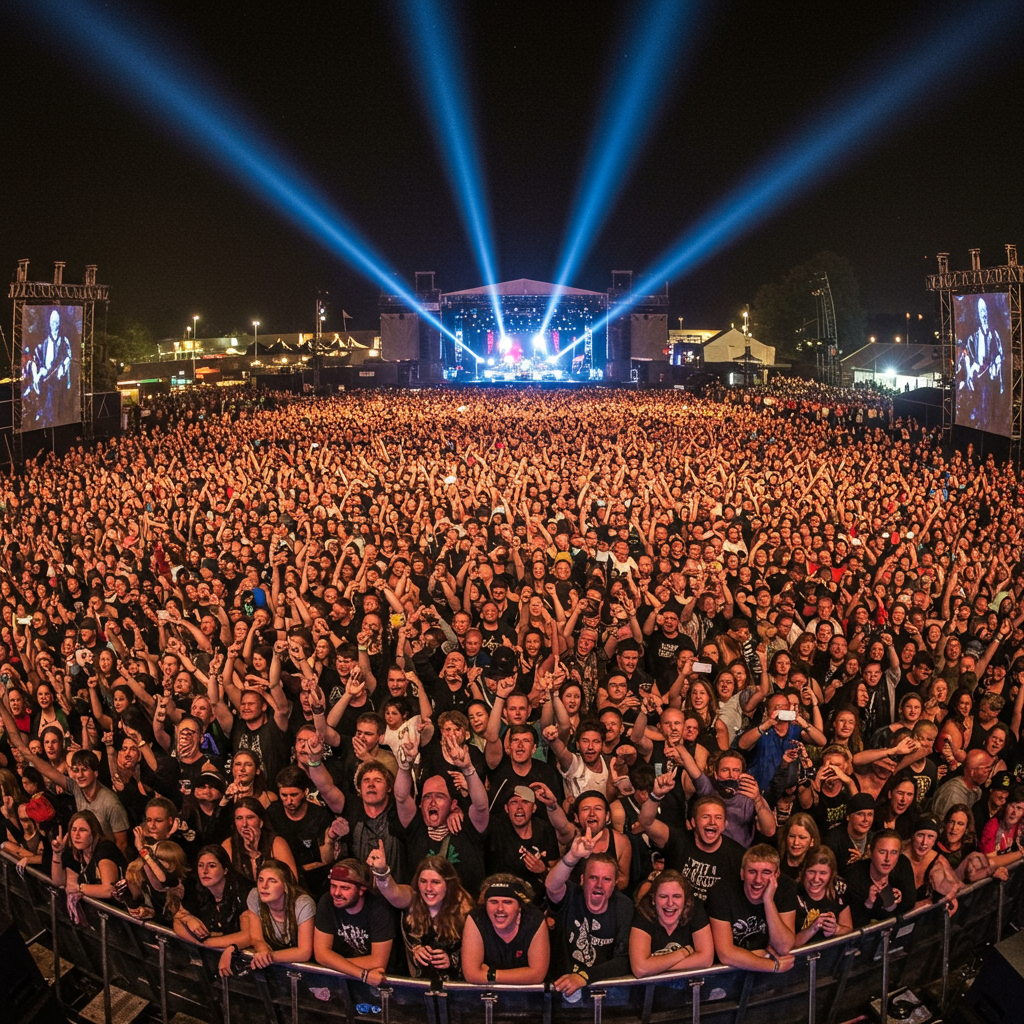Glastonbury festival 2025 witnessed a defining, and perhaps the most debated, performance of the weekend: the Irish rap trio Kneecap. Stepping onto the West Holts stage, the band delivered a set that fiercely rejected the prevailing “sunkissed good vibes,” instead unleashing a torrent of “feral, furious flows” and unapologetic political provocation. This appearance cemented their status not just as musicians but as a flashpoint in broader cultural and political conversations, drawing immense crowds and sparking widespread commentary from festival-goers to political leaders.
Twelve months prior, Kneecap had played a lunchtime slot in the Woodsies tent at the same festival. That set was largely received as a source of “boozy, edgy hilarity,” featuring playful, provocative tracks like “Get Your Brits Out” and “Rhino Ket.” However, the intervening year saw the band lean into more explicit political commentary, particularly regarding Palestine and criticism of Conservative MPs. This shift transformed their public image dramatically. By 2025, they arrived at Worthy Farm as both a “folk devil” to some and a “cause celebre” to others. The controversy surrounding their booking and impending performance became the single most talked-about topic of the festival, notably drawing “strong opinions” from figures like the UK Prime Minister and the Leader of the Opposition, Keir Starmer.
From Rising Stars to Political Hotbed
The rapid escalation of Kneecap’s notoriety illustrates a 21st-century phenomenon: fame driven as much by controversy as by musical output. This creates a potentially challenging dynamic for any artist. Far more people now hold strong opinions about Kneecap based on headlines than have actually listened to their music. The band, however, appeared intent on embracing this new reality at Glastonbury. Their set began with a bold statement, featuring a pre-recorded montage of critical voices condemning them, including sharp remarks from Sharon Osbourne. The audience responded with loud boos directed at the screen, clearly signaling their alignment with the band.
The physical presence of the crowd was staggering. The West Holts area quickly became so packed that festival stewards had to close access to prevent overcrowding and potential crushes. Visually, the space was dominated by flags, many, though not all, displaying Palestinian colors. Amidst these were flags bearing irreverent slogans, reflecting a chaotic blend of political solidarity and typical festival humor.
Onstage Defiance and Direct Challenges
Kneecap members made it clear they were not shying away from the controversies swirling around them. Mo Chara (real name Liam Óg Ó hAnnaidh) referenced the fallout from their appearance at Coachella, stating that “everyone in that fucking tent agreed with me” regarding the comments that intensified the debate around the band. A significant point of tension has been an ongoing legal issue for Ó hAnnaidh, who faces a charge related to allegedly displaying a Hezbollah flag at a London gig. While out on unconditional bail, he awaits a court hearing.
His bandmate, Móglaí Bap (Naoise Ó Cairealláin), directly addressed this “trumped up” charge from the stage. He urged the packed audience to attend Ó hAnnaidh’s forthcoming court date, initially suggesting a riot before quickly clarifying he meant showing “love and support… and more importantly, support for Palestine.” Ó Cairealláin drew parallels between the legal situation and historical instances of perceived injustices against Irish individuals within the British legal system, referencing cases like the Birmingham Six and the Guilford Four. The band explicitly targeted figures they saw as adversaries. Keir Starmer was included in a lengthy list of enemies, alongside Rod Stewart, who had recently voiced support for Nigel Farage before his own Glastonbury appearance.
The Music Behind the Message
Despite the overwhelming focus on their political stance and controversies, the review makes a crucial point: Kneecap are genuinely talented musicians. While the furore might threaten to “completely drowned out” their actual music, the quality of their performance stood out. Mo Chara and Móglaí Bap were described as “impressive rappers.” Their delivery is “raw-throated but dexterous,” and they are notably “far funnier” than their public image might suggest to someone only familiar with the controversies.
Live, their sound takes on a compelling intensity. It’s characterized as a “fizzing stew” with a powerful “bassy intensity,” drawing comparisons to the dynamic energy of The Prodigy. Specific tracks highlighted this versatility. “Fine Art” showcased sudden, dramatic shifts between dubstep elements and driving four-to-the-floor rhythms. “Get Your Brits Out” demonstrated a warped, distinctive take on classic Chicago house music, blending genres in a unique way.
A Feral Energy and Festival Impact
The combination of powerful music and charged political energy created a palpable atmosphere at West Holts. The crowd responded viscerally, breaking into encouraged mosh pits and circle pits. This level of raw, physical energy felt notably different from the generally “sunkissed good vibes” that had characterized much of the festival up to that point. Kneecap’s set was a disruptive, “feral moment” that injected intensity into the day.
The controversy surrounding the band also impacted how the set was broadcast. The BBC notably chose not to livestream Kneecap’s performance on its iPlayer service in real-time, citing editorial guidelines, although they stated it might be made available later. This decision itself became a topic of debate, further amplifying discussions about the band and their message. Meanwhile, reports indicated a TikTok livestream of the set garnered significant global engagement, suggesting alternative platforms were crucial for fans trying to watch.
Navigating Controversy on a Global Stage
Performing before a backdrop of prominent Palestine flags, Mo Chara announced himself by declaring, “Glastonbury, I’m a free man!”, a direct reference to his bail status. The crowd immediately responded with a sustained chant directed at Keir Starmer, illustrating the immediate impact of the band’s provocations. The band members openly acknowledged the stress their political stance and legal issues caused them. However, they framed their difficulties as minimal when compared to the suffering of the Palestinian people. Mo Chara delivered a powerful condemnation of the situation in Gaza, describing it as a “genocide” and accusing Israel of being “war criminals” who were not only bombing but “starving [Palestinians] to death.”
This bold political messaging on such a prominent stage ignited further discussion about the role of music and politics at large festivals. While Glastonbury has a history of hosting artists with strong political views, Kneecap’s directness, combined with ongoing legal issues and high-level political criticism, pushed this into uncharted territory for many. The performance forced attendees and observers to confront the tension between artistic expression, free speech, and the potential impact of controversial messages on a public platform.
The Future of Kneecap
The review concludes by acknowledging the uncertainty of Kneecap’s trajectory. Whether their current notoriety remains a brief flashpoint, evolves into a more enduring part of their identity, or ultimately proves detrimental to their career remains to be seen. However, for the massive audience packed into the West Holts field at Glastonbury 2025, the set was undeniably triumphant. It was a powerful, memorable, and provocation-filled performance that transcended typical festival entertainment to become a significant cultural moment. The legacy of Kneecap’s Glastonbury 2025 set will likely be debated for years to come, symbolizing a clash between artistic expression, political activism, and mainstream acceptance on one of the world’s biggest stages.
Frequently Asked Questions
What was the main controversy surrounding Kneecap at Glastonbury 2025?
The primary controversy stemmed from Kneecap’s outspoken political stance, particularly their explicit support for Palestine and criticism of British politicians like Keir Starmer and Conservative MPs. This built on previous controversial comments and actions, escalating significantly due to an ongoing legal charge against band member Mo Chara related to displaying a Hezbollah flag. The band leaned heavily into these controversies during their set, making them the most talked-about act at the festival.
Where did Kneecap perform at Glastonbury 2025 and why was the area notable?
Kneecap performed on the West Holts stage at Glastonbury 2025. This specific stage became notable during their set because the crowd was so large that festival stewards had to close access to the area for safety reasons to prevent a crush. The massive turnout highlighted the immense public interest, driven partly by the controversies surrounding the band, underscoring the significant impact of their performance.
Is Kneecap’s music overshadowed by their political actions and controversies?
While the political controversies undeniably drew significant attention to Kneecap’s Glastonbury set, the original review emphasizes that behind the furore, the band demonstrated considerable musical talent. The rappers were described as impressive and surprisingly funny, and their live sound was noted for its powerful, genre-bending intensity. The debate remains whether the widespread focus on their political activism might ultimately overshadow the recognition of their musical abilities, a tension highlighted by their polarizing performance.



